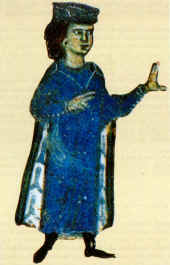William IX of Aquitaine (October 22, 1071 – February 10, 1126, also Guillaume or Guilhem d'Aquitaine), nicknamed the Troubador was Duke of Aquitaine and Gascony and Count of Poitou as William VII of Poitou between 1086 and 1126. He was also one of the leaders of the crusade of 1101 and one of the first medieval vernacular poets.
His Occitan name was Guilhèm de Peitieus.
Military life
William's greatest legacy to history was not as a warrior but as a poet. He was the first known troubadour, or lyric poet employing the Romance vernacular called Provençal or Occitan. Eleven of his songs survive (Merwin, 2002). They are attributed to him under his title as Count of Poitou (lo coms de Peitieus). The topics vary, treating sex, love, women, his own sexual prowess, and feudal politics. His frankness, wit and vivacity caused scandal and won admiration at the same time. He is among the first Romance vernacular poets of the Middle Ages, one of the founders of a tradition that would culminate in Dante, Boccaccio, and Villon. Ezra Pound mentions him in Canto VIII:
And Poictiers, you know, Guillaume Poictiers, had brought the song up out of Spain
 with the singers and viels...
with the singers and viels...William was a man who loved scandal and no doubt enjoyed shocking his audiences. He also composed a song about founding a convent in his lands, where the nuns would be picked from among the most beautiful women in the region, or from the best whores, depending on the translation. While this confirms William's lusty persona, it also makes a joke about the penitentiary convents for prostitutes founded by the charismatic preacher Robert of Arbrissel. (Bond, xlix) In fact, William granted large donations to the church, perhaps to regain the pope's favour. He also added to the palace of the counts of Poitou (which had stood since the Merovingian Era), later added to by his granddaughter Eleanor of Aquitaine and surviving in Poitiers as the Palace of Justice to this day.
One of William's poems, possibly written at the time of his first excommunication, since it implies his son was still a minor, is partly a musing on mortality: Pos de chantar m'es pres talenz (Since I have the desire to sing,/I'll write a verse for which I'll grieve). It concludes:
I have given up all I loved so much: chivalry and pride; and since it pleases God, I accept it all, that He may keep me by Him.
I enjoin my friends, upon my death, all to come and do me great honour, since I have held joy and delight far and near, and in my abode.
Thus I give up joy and delight, and squirrel and grey and sable furs.
He died on February 10th, 1126, aged 55, after suffering a short illness.
 Works online
Works onlineBiographies des troubadours ed. J. Boutière, A.-H. Schutz (Paris: Nizet, 1964) pp. 7-8, 585-587.
Bond, Gerald A., ed., transl. intro. The Poetry of William VII, Count of Poitier, IX Duke of Aquitaine, (Garland Publishing Co.:New York) 1982
Duisit, Brice. Las Cansos del Coms de Peitieus (CD), Alpha 505, 2003
Harvey, Ruth E. The wives of the 'first troubadour', Duke William IX of Aquitaine (Journal of Medieval History), 1993
Meade, Marion. Eleanor of Aquitaine, 1991
Merwin, W.S. Sir Gawain and the Green Knight, 2002. pp xv-xvi. New York: Alfred A. Knopf. ISBN 0-375-41476-2.
Owen, D.D.R. Eleanor of Aquitaine: Queen and Legend
Parsons, John Carmi. Eleanor of Aquitaine: Lord and Lady, 2002
Verdon, J. La chronique de Saint Maixent, 1979.
Waddell, Helen. The Wandering Scholars: the Life and Art of the Lyric Poets of the Latin Middle Ages, 1955
No comments:
Post a Comment